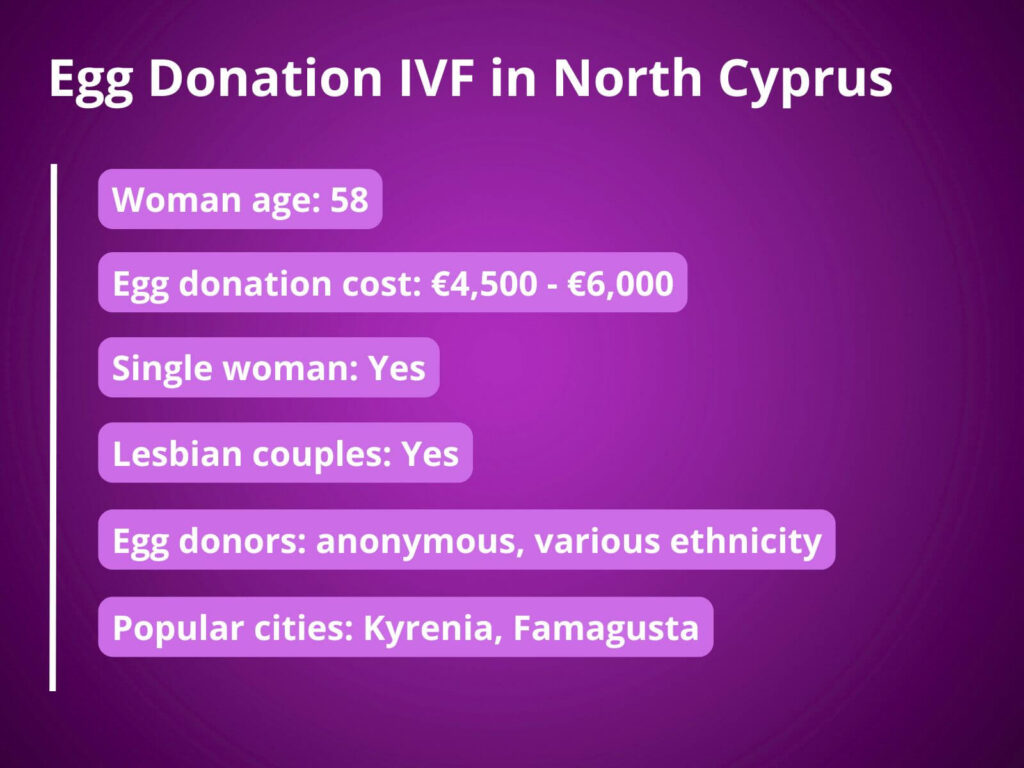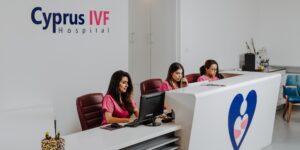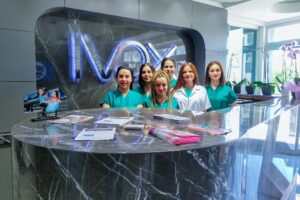IVF in North Cyprus – Frequently Asked Questions (FAQ)
Why Choose North Cyprus for Egg Donation and IVF?
What makes North Cyprus a popular destination for IVF and egg donation?
North Cyprus has become a leading choice for IVF with donor eggs, mainly because of more accessible costs compared to Western countries like the UK and US. The country’s flexible fertility law allows single women and same-sex couples to access treatments. Additionally, some clinics offer services to women up to 54-55 years old that gives more flexibility for international patients in more advanced maternal age.
How do fertility clinics in North Cyprus compare to those in other countries?
Fertility clinics in North Cyprus are gaining recognition for their high-quality services and affordable prices. Compared to the UK and the US, treatment costs are much lower, often a fraction of the price. For example, IVF with donor eggs typically costs between €5,000 and €6,000.
Why do international patients choose North Cyprus for fertility treatments?
Affordability is one of the key factors, as IVF in North Cyprus costs much less than in many Western countries, typically ranging from €2,500 to €6,000. This makes the procedure an appealing option for international couples and women, seeking quality care without the financial strain.
North Cyprus has more flexible fertility regulations, making it accessible to a broader range of intended parents. Single women, same-sex couples and women in more advanced maternal age can undergo treatments in Cyprus fertility clinics that get great success rates and use advanced reproductive technologies.
Are there any unique advantages to undergoing IVF in North Cyprus?
One of the main benefits is the affordability of treatments. IVF in North Cyprus can cost up to 50% less than in the UK or Ireland—the difference that can transform what seems impossible into reality.
The country also provides more relaxed fertility treatment regulations that might not be accessible in other destinations. The professional care paired with the island’s natural beauty creates the environment where intended parents can focus on their treatment and dreams.
How accessible are clinics in North Cyprus for international patients?
Clinics in North Cyprus are very welcoming to international patients and offer full support throughout the treatment process. Many centers have dedicated coordinators who assist with travel, accommodation, and transportation. Some clinics provide free shuttle services between the airport, hotel, and clinic, allowing international patients to focus on their treatment.
In Cyprus, IVF clinics provide services in several languages to create trust and understanding, ensuring that women can focus on what matters most.
What role does the cost-effectiveness of treatments in North Cyprus play in its popularity?
In North Cyprus, the cost of a single IVF cycle typically costs between €2,500 to €3,000, which is a more affordable path compared to the UK, the US, or Canada. This cost difference makes it an appealing option for couples seeking affordable fertility treatments without sacrificing quality.
Many clinics offer all-inclusive packages that cover essential tests, medications, and treatments, helping patients manage their budgets while receiving top-notch care.
Are there cultural or language advantages for international patients in North Cyprus?
Multilingual medical teams and coordinators speak English, Turkish, German, and other languages to guarantee clear communication and easy discussions for patients.
Culturally, North Cyprus is a welcoming destination, blending Turkish and Mediterranean charm. This diversity creates a comfortable atmosphere for international patients that will be surrounded by people who understand their needs and hopes.
Costs and Affordability
How much does IVF with egg donation cost in North Cyprus?
The cost of IVF with donor eggs typically ranges from €5,000 to €6,000, depending on the clinic and what services are included. The treatment usually covers the full cycle, including egg donation, IVF, and embryo transfer.
Many clinics also offer packages that may include embryo freezing, storage, and follow-up care. Additional services like genetic testing or multiple IVF attempts may increase the total cost.
Are IVF costs in North Cyprus more affordable than in other countries?
While IVF in North Cyprus can start from €2,500 per cycle, the same procedure can cost much more in the UK, the US, or other European countries. For example, in the UK, IVF with egg donation can cost between £8,000 and £12,000 per cycle, and in the US, it can range from $18,000 to $30,000.
What is typically included in the cost of IVF in North Cyprus?
The cost of IVF in North Cyprus usually covers the initial consultation, diagnostic tests, and medical evaluations. It also includes egg retrieval, IVF procedure, and embryo transfer. Clinics can also include medications for the egg recipient in the price.
Check with the clinic what’s included in the package, as some optional treatments may not be covered.
Are there any hidden costs in the IVF packages offered in North Cyprus?
IVF packages in North Cyprus are generally affordable, but like in other destinations, there may be extra costs to consider. The quoted price typically covers consultations, egg retrieval, the IVF procedure, and embryo transfer.
However, medications, preliminary tests, and travel expenses may not be included. International couples should check the details with the clinic to understand what’s covered and ask about any additional charges upfront.
How do travel and accommodation costs factor into the overall affordability?
While IVF in North Cyprus is an affordable option, it’s important to look at the full financial picture when planning a fertility journey. If you are planning the treatment, also consider costs like international travel and accommodation. International flights and hotel expenses vary depending on where you’re traveling from—European flights are generally cheaper and shorter, while those from North America, Asia, or Australia may be more expensive.
Many clinics offer travel packages that include airport transfers, hotel stays, and transportation to the clinic, helping to simplify logistics and potentially reduce costs. Check with clinics to confirm what’s included in the packages.
Egg Donors and Screening
Are egg donors in North Cyprus anonymous or identifiable?
In North Cyprus, egg donation is anonymous, meaning neither the donor’s nor the recipient’s identities are disclosed. Clinics follow strict laws to ensure confidentiality, though recipients may receive basic details like the donor’s age, physical traits, and education—without any identifying information or photos.
What are the legal requirements for egg donors in North Cyprus?
In North Cyprus, oocyte donors must be between 19 and 35 years old, and pass detailed medical and genetic screenings to ensure they are healthy and free from infectious diseases or genetic disorders.
Donors provide informed consent, understanding the risks and confirming their eggs will be used for IVF treatments. While children born through egg donation can access non-identifying medical information when needed, the donor’s identity remains completely private
How are egg donors recruited and screened in North Cyprus?
In North Cyprus, egg donors are carefully selected based on health, psychological well-being, and ethical standards. Most young women (students and professionals) are between 19 and 30 years old, recruited through universities, medical institutions, and online platforms.
Donors go through a comprehensive screening process to assess both their physical and mental health before being approved for donation.
Can recipients choose donor characteristics such as ethnicity, physical traits, or education?
Yes, many fertility clinics in North Cyprus let recipients choose certain traits in their egg donor, such as ethnicity, and physical features such as hair color, eye color, height, and skin tone. Clinics provide donor profiles with these details, helping couples and women find a match that aligns with their preferences. Some clinics also share information about the donor’s educational background, career, and interests.
How does North Cyprus ensure the safety and well-being of egg donors?
In North Cyprus, egg donors’ safety and well-being come first. Clinics follow strict guidelines and ethical practices to ensure donors fully understand the process, potential risks, and implications.
Candidates go through comprehensive medical tests, including bloodwork for infections, fertility assessments, genetic screening, and more.
What steps are taken to ensure donor compatibility with recipients?
Clinics in North Cyprus carefully match egg donors with recipients to ensure the best possible compatibility. During the personalized process prospective parents fill out a form specifying their preferences for the donor’s traits like ethnicity, physical appearance (age, height, weight, hair and eye color), education, and hobbies.
Egg Donation and Matching Process
What is the process for egg donation in North Cyprus?
The egg donation process includes several steps and starts with an initial consultation. The recipient meets with a fertility specialist to review and discuss medical history, available treatment options, and necessary tests. After sharing preferences for the donor, the clinic starts a matching process. Once a match is completed, the donor is prepared, and the clinic performs fertilization and embryo transfer procedures. Recipients usually need to stay for a couple of days in the country to finalize the egg donation process.
How long does it take to match with an egg donor in North Cyprus?
Clinics understand the needs of international patients and optimize the process which usually takes a few days to a couple of weeks, depending on the recipient’s preferences and medical needs. After the initial consultation and medical evaluations, the clinic selects a suitable donor. Most clinics have a database of egg donors and can often find a match quickly, especially if the couple is flexible.
Can recipients bring their own egg donor to North Cyprus?
In North Cyprus, recipients cannot bring their own egg donors for IVF treatments. The law requires that all donations be made through registered clinics, using their own donor databases.
Are shared or exclusive donor cycles available in North Cyprus?
In North Cyprus, clinics offer both shared and exclusive egg donor cycles, giving international patients the flexibility to choose the option that best suits their needs and preferences.
Can unused eggs or embryos be frozen for future use?
Yes, clinics can freeze unused eggs or embryos for future use. Many hospitals offer this option and patients do not need to go through another full cycle in the future.
Do clinics in North Cyprus offer options for genetic testing with donor eggs?
International patients can combine treatment with donor eggs with genetic testing. Procedures like Preimplantation Genetic Testing (PGT) screens embryos for genetic issues before they are transferred, helping reduce the risk of genetic disorders and improving the chances of a successful pregnancy.
What is the process for selecting donor traits in North Cyprus?
In North Cyprus, selecting donor traits involves reviewing available profiles with the fertility clinic. These profiles usually include medical history, details about physical traits such as hair color, eye color, height, skin tone, and sometimes educational background, personality, and interests.
After the initial consultation and medical evaluations, the clinic selects the candidates. Once the patient receives the list and approves the donor, the clinic prepares ovarian stimulation and egg retrieval.
How do clinics in North Cyprus ensure compatibility between donor and recipient?
Medical teams match egg donors and recipients through careful evaluation. First, they assess the medical history and genetic profiles of both parties. After confirming medical suitability, donors and recipients are often matched based on physical traits like hair color, eye color, height, and skin tone. This helps create a familial resemblance. Some clinics may also consider the donor’s educational background, interests, and personality, depending on the available information. However, the main focus is on medical and genetic compatibility.
Success Rates and Risks
What are the success rates for IVF with donor eggs in North Cyprus?
IVF with donor eggs in North Cyprus generally have high success rates, similar to those in the UK and US. Success can depend on factors like the recipient’s age, the quality of the donor eggs, the clinic’s experience, and the IVF treatment used. On average, success rates range from 50% to 70% per embryo transfer, with some clinics reporting even higher rates for IVF with donor eggs treatment. The success raters are lower for IVF with own eggs, and the vary as per the patient age.
How do fertility clinics in North Cyprus achieve high success rates?
IVF clinics get high success rates thanks to advanced technology, expert care, and strict quality control. In IVF with donor eggs, a key factor is using oocytes of young (typically under 35 years old) and healthy donors. Many clinics also use advanced techniques like genetic testing (PGT), to screen embryos for chromosomal issues, ensuring that only the healthiest embryos are transferred.
Are success rates for IVF treatments in North Cyprus independently verified?
It varies from clinic to clinic, but many of them are transparent and openly share their results, internal mechanisms, audits and methodologies as they believe in building trust with their international patients.
What factors influence success rates in North Cyprus clinics?
Success rates for IVF are influenced by several factors. One key factor is the young age and good health of the egg donor, as younger women (usually under 35 years old) tend to produce higher-quality eggs.
The experience and skills of the clinic’s medical team also play a major role. Many clinics in North Cyprus have highly trained fertility specialists with extensive experience in IVF, especially with donor eggs. Additionally, the use of advanced technologies can improve success rates of fertility treatments.
What are the potential risks associated with IVF and egg donation in North Cyprus?
Like any medical treatment carried out according to medical protocols, IVF with donor eggs comes with potential risks. The process may have some negative consequences such as emotional stress, pregnancy loss, and some complications from the egg retrieval process, such as bleeding or infection. While these complications are rare, the journey can be challenging. While IVF is generally safe and effective, be open and discuss risks with your healthcare provider.
How do clinics in North Cyprus minimize risks for patients?
The health of both egg donors and recipients are very important to the medical teams. To minimize risks, facilities use a range of strategies and techniques, including personalized treatment plans, thorough medical screening, and close monitoring of every step of the journey. With the support of advanced medical technology, clinics ensure a safe and supportive environment for everyone involved.
Age and Eligibility
What are the age limits for IVF treatment in North Cyprus?
In North Cyprus, clinics set the age limit for IVF between 45 and 58 years old. International patients aged 55 and above should meet certain criteria to undergo the treatment.
Can single women or same-sex couples access IVF with donor eggs in North Cyprus?
Yes, single women and same-sex couples can undergo IVF with donor eggs in North Cyprus. The country takes a progressive approach, allowing access to fertility treatments regardless of marital status or sexual orientation. Many clinics are welcoming and provide a supportive environment throughout the journey.
What is the legal parenthood status for recipients in North Cyprus?
In North Cyprus, the recipient of IVF with donor eggs is legally recognized as the child’s mother, whether she is married or single. The egg donor stays anonymous and has no parental rights or responsibilities.
Are there exceptions to the age limits under special circumstances?
In North Cyprus, IVF age limits are usually strict, with donors under 35, and recipients typically up to 54-58. However, some clinics may make exceptions depending on the individual clinic policies and the specific circumstances of the recipient, such as the patient’s health, medical history, and fertility assessments.
What is the average age of women undergoing egg donation in North Cyprus?
While there are no available statistics on the average age of women undergoing egg donation, many women turn to this option due to age-related fertility challenges, such as low ovarian reserve or other fertility concerns.
Are there specific eligibility criteria for international patients?
International patients can access IVF with egg donation in North Cyprus, but they must meet certain eligibility criteria. Patients generally need to be at least 18 years old and in good overall health to undergo treatment. Clinics often review the patient’s medical history to ensure that IVF and egg donation are suitable for their situation. Some clinics can ask international patients to provide necessary medical documentation, such as test results and/or details of previous fertility treatments. Some facilities may have additional requirements depending on the individual case.
Treatment Details
How personalized are treatment plans at clinics in North Cyprus?
In North Cyprus, clinics create personalized treatment plans based on each patient’s medical history, lifestyle, and health concerns. Fertility experts conduct detailed consultations and assessments to fully understand the patient’s needs before recommending a treatment. This customized approach ensures treatments are effective and tailored to each person’s goals, leading to better satisfaction. Healthcare providers in North Cyprus focus on patient-centered care, working closely with individuals to develop a plan that aligns with both medical and personal preferences.
How many visits are required for international patients undergoing IVF in North Cyprus?
International patients undergoing IVF in North Cyprus usually need at least two visits. The first is for consultations, tests, and treatment planning, where doctors assess fertility health and discuss the IVF process. The second visit is for the IVF procedure, including egg retrieval and sperm collection. Depending on the treatment plan, some patients may need to stay longer in the country.
Can treatment coordination occur between clinics in North Cyprus and local doctors?
Yes, treatment coordination is possible between clinics in North Cyprus and local fertility doctors. Many clinics are experienced in working with international patients and are open to sharing medical records, treatment plans, and test results with local healthcare providers. This allows the local doctor to monitor the patient’s health while at home.
For IVF, for example, the local doctor may assist with initial consultations, hormone treatments, or follow-up care after the patient returns home. This collaboration creates a strong, supportive partnership and brings peace of mind to patients, knowing that their care is coordinated.
Are fresh and frozen embryo transfers both available in North Cyprus?
Clinics in North Cyprus offer both fresh and frozen (cryopreserved) embryo transfers. The choice between fresh and frozen transfers depends on the individual’s situation, and doctors work closely with each patient to guide them towards the best decision.
What happens if the first IVF cycle is unsuccessful?
If the first IVF cycle fails, clinics in North Cyprus provide support to help patients navigate the next steps. The healthcare team will carefully review the cycle to understand what may have affected the outcome, looking at factors like embryo quality, the patient’s response to treatment, and the health of the uterus. They may perform extra tests to check for issues like hormonal imbalances, uterine conditions, or genetic factors, and adjust the treatment plan accordingly. With careful planning and continued care, many patients have successful pregnancies after a second attempt.
Are there options for preimplantation genetic testing (PGT) in North Cyprus?
Yes, preimplantation genetic testing (PGT) is available at clinics in North Cyprus. International patients with a family history of genetic disorders or those of advanced maternal age may choose PGT to improve the chances of a healthy pregnancy and reduce the risk of passing on genetic conditions.
What are the options for fertility preservation in North Cyprus?
Fertility preservation options are offered with care and understanding at clinics in North Cyprus, giving individuals and couples the chance to safeguard their fertility for the future. One of the most common methods is egg freezing, often chosen by women who want to delay pregnancy for personal, medical, or professional reasons. Men who need to preserve sperm for medical reasons or want to delay fatherhood can benefit from sperm freezing.
For families undergoing IVF, advanced embryo freezing is another option, allowing potential beginnings to be preserved for use in future cycles. Clinics in North Cyprus use advanced cryopreservation techniques to keep family-building options open.
Do North Cyprus clinics offer dual donor cycles (both egg and sperm donation)?
Yes, clinics in North Cyprus offer double (dual) donation cycles, where both egg and sperm donations are used in IVF programs. This option is ideal for individuals or couples facing fertility challenges with both egg and sperm quality or those who need both for reasons like advanced maternal age, genetic conditions, or male infertility. The clinic coordinates both donations to provide a complete solution for patients.
Legal and Ethical Considerations
What are the legal regulations governing egg donation in North Cyprus?
In North Cyprus, egg donation is subject to strict guidelines and regulations to ensure ethical practices and protect the rights of all parties involved. The process is anonymous, with strict confidentiality between the donor and recipient. Egg donation with the matching process can only take place through licensed fertility clinics, and potential donors must meet specific medical and psychological criteria, including screening for genetic disorders, infectious diseases, and psychological assessments.
Donors must be between 18 and 35 years old, with many clinics preferring a narrower age range. Compensation for egg donors is allowed but is strictly regulated, covering only their expenses rather than acting as financial incentive.
Is donor anonymity legally enforced in North Cyprus?
Yes, donor anonymity is legally protected in North Cyprus. The regulations ensure that the donor’s identity remains confidential and is not shared with the recipient or any child born from the donation. This legal framework safeguards the donor’s privacy and maintains anonymity throughout the process.
Can donor-conceived children access donor information in North Cyprus?
In North Cyprus, donor-conceived children do not have the legal right to access identifying information about oocytes donors. The laws emphasize donor anonymity, keeping the donor’s personal information confidential.
What legal rights do egg donors have in North Cyprus?
Egg donors are protected with legal rights that prioritize their health, privacy, and well-being. One of the most important rights is informed consent, meaning donors must fully understand the egg donation process, its potential risks, and any medical procedures involved.
Egg donors also have the right to confidentiality and anonymity, with their personal information kept private by law. Additionally, donors have no legal rights or responsibilities toward any child born from their donation, as the intended parents are recognized as the legal guardians under North Cyprus law.
How does North Cyprus compare to other countries in terms of IVF legal frameworks?
North Cyprus has a flexible and patient-friendly legal framework for IVF, making it a popular destination for fertility treatments. Unlike some countries with strict age limits, marital status requirements, or bans on certain procedures, North Cyprus offers IVF to married and unmarried couples, as well as single women. The country also allows advanced reproductive options like egg and sperm donation, embryo donation, gender selection (for medical reasons), and surrogacy in some cases, which are restricted in other countries.
A key difference is its approach to donor anonymity. Unlike countries e.g. the UK, where donor-conceived children can later access donor information, North Cyprus enforces strict donor anonymity.
Are North Cyprus clinics required to follow ethical guidelines for fertility treatments?
Facilities in North Cyprus don’t have to – however most of the do, follow ethical guidelines for fertility treatments to ensure patient safety, uphold medical standards, and protect the rights of patients, donors, and children born through assisted reproductive technologies (ART). These guidelines cover informed consent, confidentiality, and the responsible use of treatments like IVF, egg and sperm donation, and embryo transfer.
IVF clinics must ensure patients are fully informed about the potential risks, benefits, and outcomes of treatments. They are also required to protect donor anonymity and patient privacy.
Travel and Logistics
What travel requirements should international patients be aware of when visiting North Cyprus?
International patients traveling to North Cyprus for fertility treatments should be aware of travel requirements, such as visa regulations, entry procedures, and health considerations. Most flights to North Cyprus connect through Turkey, as there are few direct flights. Depending on your nationality, you may need to arrange a visa before arrival, so it’s important to check the visa requirements or contact your clinic for more information or assistance.
Do patients need a visa to receive medical treatment in North Cyprus?
Whether a patient needs a visa for medical treatment in North Cyprus depends on their nationality. Many travelers, including those from the EU, UK, and Turkey, can enter without a visa or get one on arrival for short stays, including medical purposes. However, some nationalities may need to apply for a visa in advance. Contact your clinic in advance to discuss all details.
How long should patients plan to stay in North Cyprus for treatment?
The length of stay for fertility treatment in North Cyprus depends on the procedure. For IVF, patients usually stay 10 to 20 days to allow time for monitoring, egg retrieval, fertilization, and embryo transfer. Some clinics understand the logistics challenges of international patients and offer flexible options, where future parents can start e.g. hormone treatments at home (or coordinated with a local clinic) and only travel to North Cyprus for the final stages, reducing the stay to 5 to 7 days.
For IVF with donor eggs the stay depends on the clinic and circumstances, and varies from 3 to 9 days.
Are there direct flights and easy transport options to North Cyprus?
There are no direct international flights to North Cyprus from most countries. To get there, travelers can fly into Turkey (for example Istanbul or Ankara), or into Larnaca and then take a taxi/private transfer.
Do clinics in North Cyprus provide assistance with travel and accommodation arrangements?
Yes, many fertility clinics in North Cyprus help international patients with travel and accommodation. Clinics’ international coordinators assist with booking flights, arranging airport transfers, and finding accommodation that suits the patient’s budget and preferences. Some clinics also have partnerships with nearby hotels or apartments, offering discounted rates for their patients.
Is language a barrier, or do clinics offer multilingual support?
Language is usually not a barrier for international patients in North Cyprus, as most clinics offer multilingual support. Their medical staff and coordinators speak English, and some clinics also have interpreters or staff who can assist in languages like Turkish, Arabic, French, German, and Italian.
What are the best times of the year to travel to North Cyprus for treatment?
Spring (March to May) and autumn (September to November) are the best times for the treatment. The weather is mild and comfortable during these months, making travel and recovery easier. Spring offers pleasant temperatures and blooming landscapes, while autumn is warm but not too hot, perfect for relaxation between appointments.
Although treatment is available year-round, summer (June to August) can be very hot, with temperatures often above 35°C (95°F), which may be uncomfortable for some individuals. Winter (December to February) is mild but can have occasional rain and cooler temperatures that may affect travel plans.






